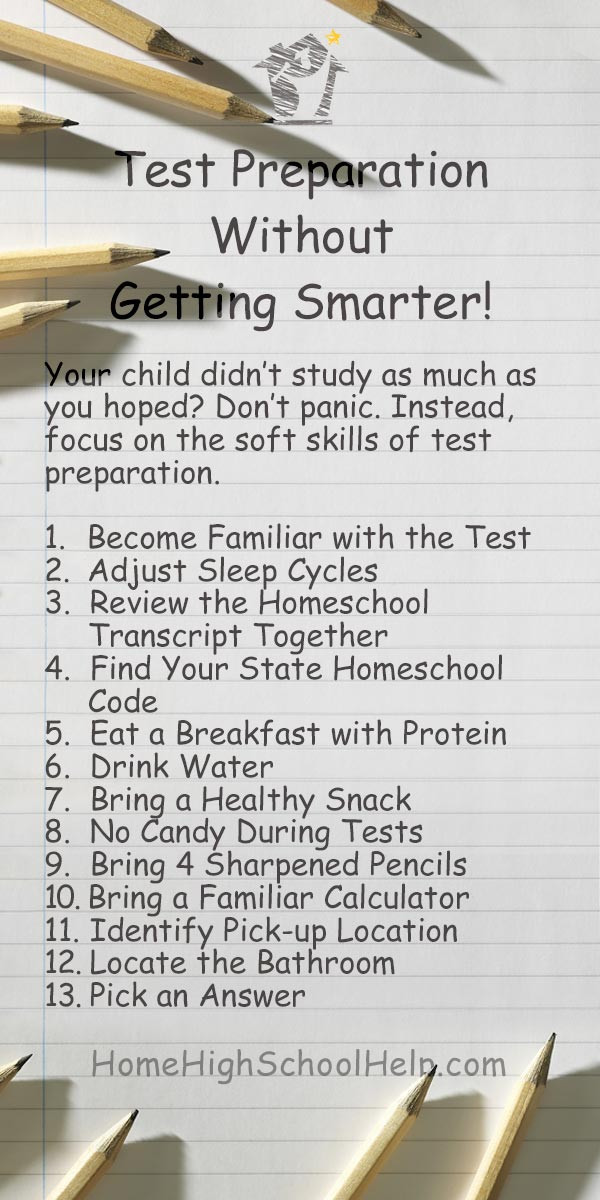Test Preparation Without Getting Smarter
When do you start the process of test preparation? Which strategies are most effective for college admission test practice? The world of college test prep can seem overwhelming! Let me bring some calm and help you learn when and how to start test preparation for best outcomes.
Updated to reflect the new digital form of the college admission tests.
Educate for Understanding
The best test preparation will always be a good education. In the elementary school years, focus on reading, writing, math, and penmanship. In the middle school years, include keyboarding. Computer-based typing skills will be critical to help your children be prepared. Make sure you are teaching math with a curriculum that makes sense to your child, and continue moving forward with one level each year. In high school, teach your child to write a complete essay in 30-50 minutes so they are prepared for college essay tests. But before formal test prep begins, the best preparation is what you and I fondly refer to as "home education." The best test prep is teaching our children reading, writing, math, penmanship, vocabulary, and thinking skills.
Start Test Preparation
When do you start the process of test preparation? For most people, the PSAT® is the starting pistol for college admission test practice. Teenagers take the PSAT for fun in October of 10th grade. That will give you a worst-case scenario test score based on no preparation. That can be the starting pistol - go! Start studying now! When the SAT® or ACT® is just a few days away, test preparation shouldn't make you worry about getting smarter! Just prepare for the test. Sure, it would be great if every child was compliant, studied for the college admission tests with a willing and eager attitude, and scored above average, but we live in the real world. Sometimes the test is SOON and the child has potentially, accidentally, forgotten to study for good reason or no reason at all. When this happens, what can you do? Focus on the soft skills of test preparation, not the academic-based answers to the questions.
It makes sense to give children some exposure to the PSAT briefly beforehand, so they aren't shocked, but delay heavy-duty test preparation until you have the "starting place" score so you can measure the success of your studying. Some teens aren't ready to incorporate test prep that easily, and for them it makes sense to start test preparation in 11th grade, after taking the PSAT. Other teens have finished geometry early, and are academically inclined. For those kids it might make sense to start test preparation earlier, in 9th grade.
But HOW do you start test preparation?
Become Familiar with the Test
Becoming familiar with the test/s your student will take can make the difference between excellent scores and meh scores. When you begin prep for the SAT® and ACT® tests, focus on becoming more confident, not smarter. Studying will help your child become more familiar with the test. Together, you will begin to learn how the tests are written and how the test makers want students to answer the questions. After a while, questions become so familiar that you start to feel like you have somehow cheated - the questions become easier and easier for your child to answer!
Test preparation can help your student become more comfortable with the testing environment too. As you use a timer for their practice sections, they'll become more comfortable with being timed and can learn to pace themselves through each section. Your student will start to relax without being anxious waiting for the bell to ring, signaling "time's up!"
Preparing for the SAT or ACT can fill the tiny gaps that are inevitable. Everyone (everyone!) has gaps, whether they are in public school, private school, or homeschooled. By practicing for their tests, students are asked little tiny questions they may not have thought of before. Once they get it wrong and look at the answer, presto! They know it and don't need to worry about it again.
Choosing between the SAT and ACT before you even begin is the best way to increase your student's score without anyone getting any smarter at all. Don't default to the SAT just because that's what your neighbors do. Often a student will score better on one test than the other, so sample both the SAT and ACT at home when it doesn't matter. Have your child take a sample of each in a timed setting with their slippers on at home, and see which one makes them naturally just LOOK smarter. Sure, many girls and science-lovers score better on the ACT, and many boys score better on the SAT, but what difference does that make? You are looking for the best test for YOUR child, and each child is unique. Use a sample test to find out which one is best.
Adjust Sleep Cycles
Make sure your child starts to get to bed earlier and gets up early, so they arrive to the real test more rested and ready. We don't want groggy, irritable attitudes the day of the big test! Earlier rising means more time in the morning to prepare. More time in the morning to prepare means more confidence. More confidence will make all the difference in their scores.
Review the Homeschool Transcript Together
To prevent the pre-test questions from freaking out your teen and making them feel like they have failed before they have even begun, be sure to review the homeschool transcript thoroughly together.
Find Your State Homeschool Code
Review your state's homeschool code so your child doesn't stress out about anything unrelated to their test score. Make sure they are confident with the code and can easily enter it from memory. Find homeschool codes here.
Eat a Breakfast with Protein
Good nutrition will see your child through this stressful event. Momentous Institute in their article The Link Between Healthy Food and Academic Performance writes: "Children who have diets lacking in fruits, vegetables, and healthy proteins tend to have lower test scores than their peers, and hunger can lead to children missing school or having to repeat grades. When children have access to adequate nutrition and healthy food options, there is an overall increase in academic performance, but especially in math and reading." Omelets, sausage, bacon, and oatmeal are excellent breakfast choices.
Drink Water
Research shows hydration improves brain function, so have your teen drink water in the morning and bring a water bottle to the test. In their article, Hydration in Education, Avalon quotes: "Research by the University of East London suggests that children who drink water will experience an improvement in their fine motor skills and visual attention. After examining five-dozen boys and girls, they found direct effects of water consumption linked to a higher academic performance. Researcher Dr. Caroline Edmonds explained that their findings "suggested that consuming water benefits cognitive performance in children." According to their study, students who drank a glass of water before their test scored up to one third better than their counterparts. I've heard it said: "hydrate or die-drate!"
Bring a Healthy Snack
Break time is the perfect time for a pick-me-up snack. Granola bars and beef jerky are excellent choices. When your child's energy fades, they should have a healthy treat to re-energize before the next test section begins.
No Candy During Tests
The sugar high and crashing low are horrible for test scores, so no sugar of any kind during tests. This includes soda, energy drinks, and the extra-large iced Frappuccino you were thinking of getting from your favorite coffee shop. Caffeine is great, but that frappe has enough sugar to give a toddler the power of world-ending destruction. Probably not a wise choice before a major test.
Bring Pens or Pencils for Scratch Work
With the switch over to digital adaptive testing this year, pencils might fall off the list in your mind. After all, who needs pencils anymore when we've got computers? Even though the tests are completely digital now, physical paper is still administered for scratch work. Studies show that for math in particular, it can be helpful to have a physical pencil and paper to work out the questions, rather than working it out mentally or on the screen. While it might no longer matter if the pencil is a #4, it is still a great idea to have one handy.
Bring a Familiar Calculator
Be SURE to bring the calculator they use every day and feel comfortable with, NOT the new one you just bought. It is important for your student to know where every button on the calculator is located for speed and efficiency. We don't want them to be searching for a button and wasting precious test time! Familiarity means confidence.
Bring a Fully Charged Testing Device
While some testing centers might provide devices for students to test on, many do not. The College Board recommends bringing your own fully charged device to test on. Be sure that the Bluebook application is already installed, and any test setup has been completed before arriving at the testing center. Bluebook has strict guidelines on which devices meet approval, so be sure yours is up to snuff! Bluebook Approved Testing Devices.
Bring your Current Admission Ticket from Bluebook
After you have completed the test setup on your testing device, the app will generate an admission ticket for you. It is vital that you bring this along with you on test day or you will not be allowed to test. Bluebook allows you to take a picture, screenshot, or print or email the ticket, though printed is preferred. Double check with your testing center to make sure they accept all of these forms of the ticket.
Bring Photo ID
You must have a legal form of photo ID. For 10th graders who don't have their driver's licenses yet, a passport is a fine and legal alternative. Some parents have asked if the ticket is an adequate form of identification, and Bluebook says a resounding "no". You must have BOTH the ticket AND the photo ID. The ID backs up the information on the ticket and assures you are who you say you are. Don't forget this essential item!
Cheapest, Easiest, Most Effective Test Preparation
Familiarity with the test will increase the test score even if they don't get smarter, because kids will get more comfortable with the format and how the questions are asked. Anything you can do to keep teens alert and rested will increase the test score without studying because it will allow their brain to fire on all cylinders. Nutrition and hydration improve brain function. Reducing stress levels will allow them to be as relaxed as possible in an already stressful situation. Formal college admission test practice at home is the cheapest, easiest, and most effective strategy, just like for most other things we teach.
But when you do teach test preparation in earnest, consider doing one section of the test each day, three days a week or so to develop test stamina. It's like a runner developing endurance. Taking a full length, timed test once a month would be awesome practice for the full length "real deal" test on exam day.
If your children aren't willing or able to study test prep at home, that's when it's a good idea to reach out for help and find a test preparation tutor or class.
Help your teen increase their test scores by preparing them ahead of time with practice. You can decide which test fits them best, even! Learn more about my Recommended Study Guides and How to Ace College Admission Tests.
Before or after the test, you may want to mention that the test is only an indication of certain academic abilities, it's not a reflection of what is truly important in this world. You may want to review this list of Character Qualities Not Measured by Tests. Good luck on the test!
When you subscribe to the blog, we will send you an e-mail when there are new updates on the site so you wouldn't miss them.

 Login
Login









.jpg)

Comments